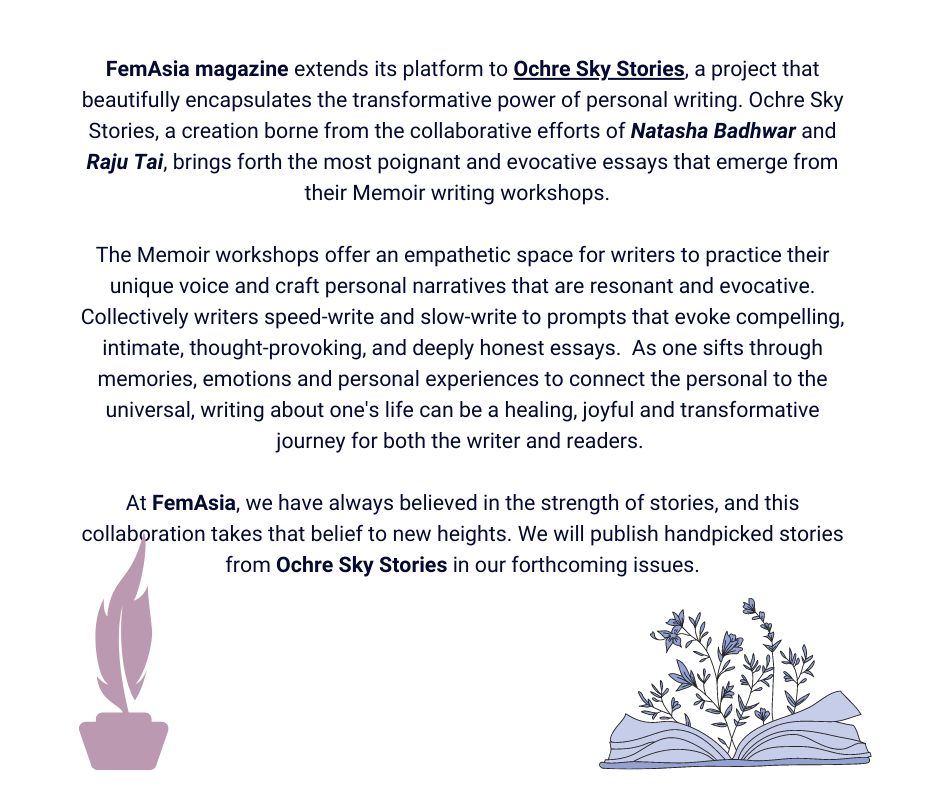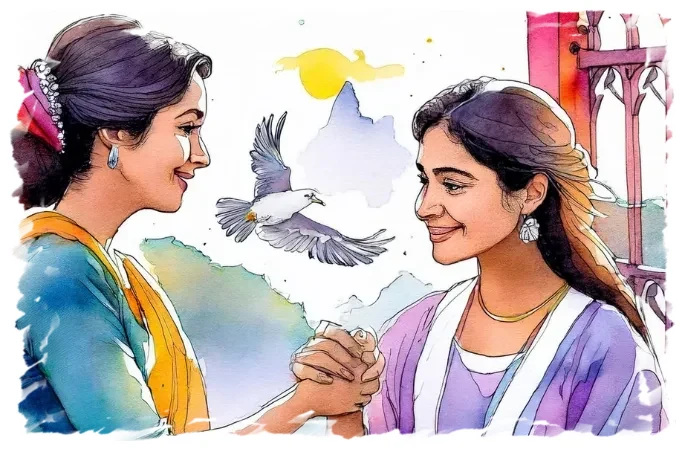On an autumn Sunday morning in Kolkata, the air was nippy, and my bed was warm when I felt my mother patting my face. Her touch felt light on my skin; her palms were soft and fluffy, like the pillow under my head.
She whispered the time into my ear. 9 AM: the last call for decent daughters to wake up in a household run on military protocols.
I winced and turned away: a signal for her to disappear. It was too early to leave the safety of sleep.
The Koel outside the window began belting its love song. Over the next 20 minutes, its frenetic, sugar-sweet calls would mess up my head and drive me out of bed.
“Uff!” I hissed at my sleep intruders.
But the urgency in mummy’s voice intensified. Her pats started falling on my face like the pitter-patter of rain: soft, then rapid, turning sharp, like the drizzle before a heavy downpour. Within minutes, she was shaking me, roughing up my shoulders. “Get up now! Uttho! Toofan aa gayaa hain (There’s a storm outside). You don’t have time.”
The November light streaming from the window lit my mother’s face. She looked frail in the mellow hue, like the delicate flowers on her pastel blue Kota saree. My half-sleepy eyes traced the lines of fear on her forehead. Her hair was messy, perhaps from the morning chores.
“You have to leave home, abhi (now). Dadaji tumhein yahan jeene nahin denge (Your grandfather won’t let you survive in this house),” she said.
Mummy’s instructions were always short and simple.
“Take a quick shower and leave before more people jump into the akhara (wrestling pit), and thrash you another time. Take a taxi and go to Nanibari ( house of Nani, my maternal grandmother). From now on, you will live with her. You will also get married from there. I will pack your suitcases and send them to her place later in the evening.”
Mummy’s plan for my rescue and release was precise, straightforward, and made with love – the same traits with which she had built her culinary fame over decades.
I pulled myself and sat up on the bed. The Koel was now shrieking out loud for love. Mummy clasped my hands and hugged me awkwardly. Her long embrace was both a plea and a permission for me to leave her forever.
Mummy had lost her husband when she was 30. She was permitting herself to lose her daughter in her 40s. After raising me on frightening stories of the dangerous outside world, she was opening the doors to a life where strangers would be safe, acquaintances kind, and allies would emerge from unknown spaces to lend a hand to my dreams.
The backstory
Two days before this act of permission, I had informed my grandfather and uncle about the man I was going to marry.
The storm that followed was exactly as I had imagined. A girl with a late father could not stray outside family norms.
Two tall men, one muscular, the other lean, had rained abuses and accusations on me, threatening to break my limbs, throw me out on the streets, disinherit my mother and brothers, and wipe every stain of my name from our family tree.
The family would leave no stone unturned to crush any threat to the multi-generational family tradition of arranged marriages. Dadaji and Chacha (grandfather and uncle) gave me two days to change my mind. I told them in two minutes that I would not. How hard could it be to say no to a life of death?
Exactly a year ago, I had been beaten and locked up in a room for calling off an arranged marriage alliance. My voice had squeaked then. It was stable now. I knew from practice that the rage of abusive men deflates like a flat tyre before a confident, undeterred voice.
The Meshwork of Permissions
Two hours before my mother shook me awake, my grandfather convened a family panchayat on the central balcony of our home. The balcony was the beating heart, the community center of our large, noisy, high-energy family. He riled my mother before mute spectators for raising a shameful, lust-craving, men-obsessed daughter.
My mother flew straight into enemy territory. Like a stoic General, she bartered some parts of her life in exchange for the freedom of her precious hostage. She respectfully asked her father-in-law to shut up. Then, she demanded that I be allowed to leave the family without violence or harm. In return, neither she nor my brothers would ever contact me. She gave her word that no other member of our family unit would ever challenge the family norms from thereon.
At 11 am, I walked down the driveway of our home. It was silent and empty, except for the tall Ashoka trees on both sides. I was wearing a mauve kurta with a marmalade orange salwar and chiffon matching dupatta. I had an intricate Kantha-embroidered sling bag on one shoulder and silver Kolhapuris on my feet. I had dressed to the most trending colour palette of the day, covered from head to toe, with gifts from my mother on my 21st birthday.
Did my family of 20—uncles, aunts, siblings, cousins—come out of hiding from their rooms and step onto the balcony, patio, or terrace to watch as I walked out of the large red iron gates of 57/8 Ballygunj Circular Road?
I did not turn to check.
Did my sweet little cousins wave to me; did my brothers call out; did Daadi hold back her tears; did Shani, the cantankerous domestic help, shake her head from side to side; did my aunts hold my sobbing mother: this General who had been broken by the biggest win of her life?
In the meshwork of permissions that shape natal family violence, what permission did the adult members of my family give themselves that day?
Did they permit themselves to bear witness?
Did they allow themselves to confront my grandfather?
Did they vow that they would never let this happen to their daughters?
Or did all of them give themselves permission to sink into cowardice as they collectively excommunicated a 22-year-old daughter of their kin?
This work was written during the Ochre Sky Memoir writing workshop facilitated by Natasha Badhwar and Raju Tai.




